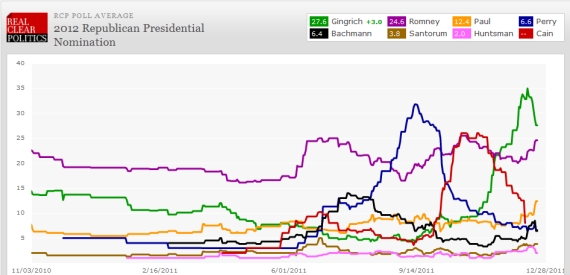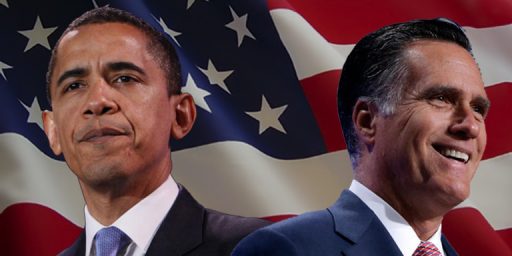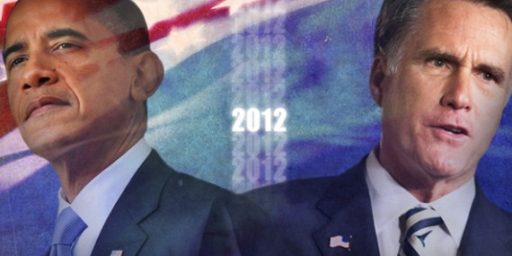Why Do We Never Learn?
A comment on the commentariat.
No doubt some (and we know who they are) will take the following post as a critique of Ron Paul. This is not the case, although Paul’s rise in the polls in the proximate cause of the post. This post is about the tendency of reporters and commentators to overreact to the moment. Increasing coverage of a candidate because of a rise in the polls makes sense and very much drives, as it should, level of coverage for a given candidate. Reading the future into a given slice of time, however, is problematic.
A couple of stories form the background and are, in not particular order, as follows:
1. Third Party Possibilities? WaPo‘s Behind the Numbers: Poll: Paul as third party candidate could doom GOP in 2012
Rather than excerpting the piece, all we really need is the following:

Note the Paul numbers and file away the fact that these would be historically high levels for a third party candidate.
2. The Most Electable? Andrew Sullivan writes:
The man who is the target of a massive smear-job in the current National Review, and whose possible victory in Iowa has already been deemed irrelevant by the national media … is now second only to Romney in match-ups with Obama next fall. Gingrich would lose to Obama by 9 points, Perry by 12.5 points, Bachmann by 14.7 but Paul would only lose by 7.7.
CNN’s poll yesterday is even more striking. It finds Romney and Paul tied behind Obama at 7 points behind. Compare that with Gingrich’s 16 point deficit. So, in one national poll, Ron Paul does the best against Obama in the fall.
3. Behold Paul, Destroyer of Caucuses. From a Politico story that Doug Mataconis noted yesterday:
Paul poses an existential threat to the state’s cherished kick-off status, say these Republicans, because he has little chance to win the GOP nomination and would offer the best evidence yet that the caucuses reward candidates who are unrepresentative of the broader party.
All of this leads to the following question : What, are we emus?
For those unfamiliar, emus are large, flightless birds whose brains are so small and have such pathetic memories that every time they meet you they are meeting a new friend. Setting aside the zoology, everyone needs to take a deep breath and meditate on a few names such as, oh I don’t know, Bachmann, Perry, Cain, and perhaps Gingrich. Remember those folks and all the analysis and commentary over whether they could win the nomination and how they would do against Obama? Now, granted, I have been distracted by stacks of exams, but I think I read somewhere that all them have flamed out (or Gingrich’s case may, or may not, be in the process thereof).
There were polls in August, for example, showing Perry as competitive with Obama. Indeed, he was up a point amongst registered voters in an ABC/WaPo poll. That during the build-up to his Peak Not Romney Status (which was in mid-September). To paraphrase a certain TV shrink: how’d that work out for us? In general, commentators should understand the danger of snap judgments about a given candidates. But in this nomination cycle in particular, one would think that caution would be especially warranted.
The basic lesson is this: the strength of a given candidate cannot be assessed until that candidate has been subject to the media and opposition scrutiny that comes with a certain level of popularity. The public, at the moment, does not have enough information about Paul for us to be in a position to trust poll numbers. As such, it is far too premature to make assertions about Paul’s electability or his potential strength as a third party candidates. I think it is often difficult for political junkies and reporters/commentators to remember, but to most people the elections are still a long way away and therefore the answers they give to pollsters are poor predictors of actual outcomes. Voters who will entertain the notion of voting for a third party candidate in December of 2011 are far less likely to be so inclined in November of 2012.
Likewise, the degree to which even the Republican selectorate, let alone the general electorate, is aware of things like Paul’s stances on foreign policy (especially Israel), the gold standard, entitlements, etc. is likely quite low. As such, I am not prepared to take electability numbers seriously at this stage.
In short: it is possible that Paul will be sufficiently popular so as to be either 1) a serious third party threat or 2) the most electable of the GOPers. However, my point is that we have nowhere near enough data to make such claims or to trust polling on these matter. Paul is currently the ascending flavor of the month. He needs to be widely sampled before we can conclude that the flavor in question is, indeed, palatable to the voters.
In regards to number 3 above: that is just a case of the media falling in love with their own self-created mythos concerning Iowa. It is not as important as they think it is (and it is hardly the case that it has never favored odd candidates as Pat Robertson won a quarter of the votes there, for a second place finish in 1988. The eventual nominee, GHW Bush won 18.6% for a third place finish).
And a note to Paul supporters: the scrutiny that Paul is now getting is not because of some special fear that The Establishment has over Paul in particular. Rather, it is the scrutiny that candidates receive when they emerge from the polling cellar. Should Santorum or Huntsman ever manage to crawl out of the deep, dark numerical hole wherein they currently dwell then they too will be scrutinized. Indeed, rather than treat all the attention that Paul is getting at the moment as some sort of special attack, his supporters ought to ought to treat it all as a kind of politician’s merit badge. It is a sign of having hit a certain level of success.
Having said that, people need to dial back discussion of electability, third party numbers, and the like until a sufficient period of scrutiny has been focused on the candidate. Paul appear to be in the upward slope of his polling numbers
I will conclude with this: if Paul is, as it seems, poised to be the next Not Romney, his timing could not be better: his numbers are rising (inspiring stories like those above) and thus inspiring scrutiny just in time for the Christmas season to hit so as to diminish the attention being paid to discussion of Paul. Indeed, I expect many people are going to be more likely to hear positive Paul stories over the next week or so than negative ones. With the Iowa caucuses just weeks away, he is in a grand position to take advantage of increased expectations without having the kind of coverage that would exist in a non-holiday period. Herman Cain would have loved such a scenario. Paul appears poised to have a successful Iowa (defined here as a first or second place finish) but with the real test coming later.







This I disagree with. When Bachmann, Cain, or Perry was surging, no one was questioning whether they were going to run as an independent. No one was suggesting that if they won Iowa, it would be the end of the caucuses. Paul is far from a perfect candidate and I agree with the assessment he likely can’t win.
What rankles me is the idea is the combination of attitude that the voting block Paul represents doesn’t even deserve to state their case, combined with a belief that we’ll just vote for whatever the rest of the party decides to do.
It’s a combination of hostility and condescension that I think we’ll end up driving Paul’s supporters to vote third party or not at all, and while Paul may not have enough support to win, the election is likely going to be close enough that he has enough support to make Romney (or whomever) lose.
A lot of the GOP just doesn’t know when to stop poking the dog.
As a Ron Paul supporter of many years I would like to say thanks for a thoughtful article that accurately describes the current political climate. Nothing here was unfair to anyone. It’s an informative and interesting piece.
In defense of my fellow Paulites, however, it isn’t the new scrutiny of Paul that raises our hackles. It’s when the pundits and “news” reporters make dismissive “unelectable” comments or suggest that Iowa and New Hampshire don’t really matter – unless someone other than Paul wins those states. Commentary of that nature appears to be a transparent attempt to manipulate rather than inform voters.
We have had some data on Paul for some time, he frequently polls as unfavorable or as the least favorable candidate among Republicans. Here’s one poll. Presumably that’s either because his positions are non-mainstream Republican, he’s not aging well from campaign to campaign season, or people find him or his supporters annoying.
Another point of data are the polls of second choice candidates. Today’s poll has Paul leading among Iowa cuacuss voters (27.5%), but he’s seventh for second choice (7.7%)
This strong evidence that Paul has a ceiling on his support and there is no evidence that Paul is doing anything to address it, frankly because Paul is probably not interested in winning as opposed to using the forum to communicate his ideas.
Heh. So it all about scrutiny.
Funny thing, though. Obama never got scrutiny. Slobbering, yes. (I shudder to think the dry cleaning bill.) Scrutiny, no.
Don’t believe me, ask Hillary.
“Why do We Never Learn?”
Who is “we”? Pundits and news junkies?
This is a great time to revisit Slate Magazines “GOP Primary Horse Race” visualization. If anyone is looking for a clear indicator of Romney’s strength as the defacto leader and the overall fluctuation of challengers, this is a really excellent thing to take a look at.
@Drew: There wasn’t much to scrutinize in Obama’s case because his public career had been so short. It turned out to be quite an advantage.
Even though the “acceptable” Republican candidates have been uttering constant streams of nuttiness that would get them laughed off the stage in any other country, Ron Paul will never be acceptable to the corporate press.
@Drew:
lol, thanks for that, Drew. Classic.
God, I want what you’re smoking. I could do such evil things with it.
@Drew- LOL. Just in case you did not know, half of the political blogosphere was devoted to scrutinizing Obama and, IIRC, all of talk radio, one particular cable TV station, the WSJ and, oh that’s enough.
Steve
@steve: Indeed. There is an odd, yet enduring, fantasy that Obama was somehow elected says scrutiny.
The best part about said fantasy is it tends to turn heavily rightward leaning believers into great fans of Hillary.
@Ben Wolf: Except Drew is using the right-blogosphere talking point that America just never heard the names Bill Ayers or Jeremiah Wright enough. It’s not about judging his record. In their minds, Obama will never have been scrutinized unless and until all of America says “community organizer” and “TelePrompTer” with a sneer.
Umm, that might be because none of those people, unlike Paul, have ever run for president as an independent…
@Drew: “Obama never got scrutiny.”
I dunno….I’ve seen his birth certificate. Have you?
PS: Just saw this over at Sullivan’s place, a Ron Paul supporter getting the “Face of the Day.” He’s holding a coin that has Ron Paul’s face on it. The coin says “Gold Standard in Leadership.”
And I have to say….that beats my Barack Obama chia-head in fetishistic kitsch.
No, you (meaning the commentariat) are fabulists. You make up stories that people want to read. Having readers is what motivates most people to blog or keeps a person employed at whatever media outlet they work at, after all.
That doesn’t mean those stories can’t be well thought-out, or even true. But, the criterion for success in media is almost always size of audience, not accuracy.
@Ratufa:
This is, of course (and sadly) true.
I actually directed the emu question at the readership as well as the writers, because if the readers didn’t fall for the regurgitation of the same series of stories about candidates X, Y, and Z then the commentators would have to write something else.
@Steven L. Taylor: What readership? Propaganda is based on what the paymasters of the propagandists want, not what the news-consuming public want. If it is done well (see, e.g., Fox News) it can shape and even create of public willing to consume and pay for the propaganda.
Who says the power of the press didn’t elect Obama?
It was one of the media’s greatest triumphs, to take a nothing senator, a nothing state legislator and a community organizer with a passel of shady and anti-American friends, some dubious Chicago connections, and a few good writers, to turn him into an elected President of the United States.
My God save us all. Vote Republican
@mannning:
Me, for one.
I find these claims that the media can somehow control the electorate in such a fashion to be unfounded in empirically demonstrable fact.
Instead of statement of fact it is a statement along the lines of “since my candidate didn’t win, the electorate must be stupid and/or brainwashed.”
@Steven L. Taylor:
Some studies seem to show neutral to positive coverage of Obama in content and tone, and decidedly negative coverage of McCain. One might say a decidingly great difference that could not help but sway voters. See:
http://www.journalism.org/node/13308
@mannning: There is a difference between noting positive coverage and claims like “the power of the press” elected Obama or that “It was one of the media’s greatest triumphs, to take a nothing senator, a nothing state legislator and a community organizer with a passel of shady and anti-American friends, some dubious Chicago connections, and a few good writers, to turn him into an elected President of the United States.”
I recognize I will not be able to dissuade you, but that doesn’t make your claim any less absurd.
I am guessing, for example, that when the electorate elects a candidate that you like it is despite of the press?
Basically, I charge the press, especially the NYT, WAPO, and LAT, and their followers with solid bias against the right, Republicans, conservatives and such. (Yes, I have been a subscriber for many years to both the NYT and the WAPO.) Same with most of the TV news media. So, yes, my men get elected despite the best the media can throw at them, subtly or otherwise. In this instance, blowing negative thoughts all over McCain was the strategy, while also being neutral to positive for Obama, and it worked well. Even Clinton complained about the unfair press, which is a switch!
The other tactic of suppressing Democratic failings while highlighting Republican blunders has a long history.
So the media did a very good job in their own estimation, and mine, in 2008 to see Obama into the White House, and to fool all too many as to their sleezy tactics.
One part that is hard to measure is the non-coverage of favorable events for a Republican candidate, yet detailed coverage of Democratic events ad nauseam. Virtually impossible to challenge, too, unless you have inside information. They even tried to keep the number of mentions fairly close so that simple counts would not show the bias. Then, too, any minor gaffe, any small slip of the tongue by a Republican is sure to be covered thoroughly, while Democratic goofs are hardly mentioned, unless the rightist outlets get a whiff of it.
One never forgets the improper slams against Bush II throughout his terms of office either. To me, those many proven to be false slams over 8 years define the Democratic Party, and the press was very willing and eager to repeat them, too, thereby fostering a negative mindset regarding Republicans that most certainly helped their eventual candidate–Obama. Does Dan Rather ring a bell? There are many others…
A further suggestion on media bias:
http://www.mrc.org/biasbasics/
Look at this too:
http://markhumphrys.com/media.obama.html#bias.08.election